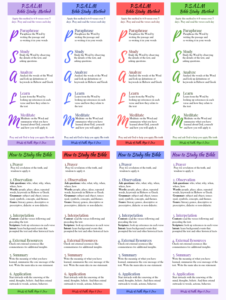It’s no secret that Christians ought to study the Bible. It’s one of the most important disciplines in a believer’s life. Alas, many do not do it. Whether they are intimidated by the Bible, don’t know how to study it or lazy, many Christians prefer reading Christian books and listen to sermons/podcast rather than spending time in the Word.
But it shouldn’t be so! We should frequently read and study the Bible to know God, hear from Him directly, and grow spiritually. And It’s equally important to be diligent students of the Word and learn how to handle it correctly (2 Timothy 2:15). In this post, I will show you how to study the Bible correctly using some basic principles of Biblical Hermeneutics.
But before we get into that, you need to know this critical truth: The Bible is not about you!
Nowadays, it’s common to approach the Bible with the mindset that it’s about us. We read stories of people like Abraham, Moses, David, and identify with them like we are the hero. But we are not. Jesus is the hero of the story, and all scripture points to Him (John 5:39).
If you read stories of the Bible (especially the OT) and don’t see how it leads to Jesus and tells the unified story of God, you will miss the point. As a result, you might either skip or apply scriptures that don’t apply to you and misunderstand those that do.
Now that we got this uncomfortable but necessary truth out the way and have put on the correct lens to approach scripture; here’s how to study it.

What is Biblical Hermeneutics?
Hermeneutics comes from a Greek word hermenuo, which means to interpret or to explain. Therefore, biblical hermeneutics is the art and science of biblical interpretation and consists of principles and methods to help us accurately understand the Bible.
When studying the Bible, it’s essential to know and use principles of biblical hermeneutics because it prevents us from twisting scriptures to fit our preconceived notions and bias.
As the Bible was written in a different era than ours, we can’t read it as we would read a contemporary book. We must be mindful of the difference in the history, culture, geography, and language between the authors of the Bible and us. We use biblical hermeneutics to bridge these gaps and determine the meaning of the text as the author intended it. And it helps us understand Scriptures in more depth, and apply it to our lives correctly.
There are three different approaches to Bible study.
1. Exegesis
Exegesis means to draw out or lead out. It is the process of drawing out the meaning of a text as the author intended it, and explaining it based on careful analytical study and examination.
2. Eisegesis
Eisegesis is the opposite of exegesis, and it means to draw in. It’s the process of adding our ideas and bias into the text and forcing it to mean something it doesn’t naturally say.
Learn more on exegesis and eisegesis here.
3. Narcigesis
Narcigesis is the combination of two words, narcissism and eisegesis. It is the art of reading ourselves into the Bible and making it about us. In this process, not only is the meaning of the Bible forced, but it’s forced to center around the reader.
Learn more on narcigesis here
Exegesis is the proper way to study the Bible. And the most important rule to observe when exegeting the Bible is interpreting it literally. Unless the text uses figures of speeches or symbols, it means what it says and says what it means. Contrary to popular belief, the Bible doesn’t have hidden truths needing deciphering. It’s to be understood literally and plainly.
Essential steps for Bible study
There are various Bible study methods and acronyms out there. Regardless of which way you use, it must include the following steps to exegete the Bible correctly.
1. Prayer
The most crucial step of Bible study is prayer. Your knowledge of hermeneutics won’t matter if you do not ask the Holy Spirit for wisdom and revelation. Before opening your Bible, pray first. Ask the Holy Spirit to give you revelation by opening your eyes and illuminate the truth of the Word (Psalm 119:18). And ask for wisdom to understand and apply the truth to your life (Psalm 119:34).
2. Observation – what is the text saying?
Observation is noticing details about the text. The goal is to remove bias and perceive things we might have become oblivious to due to familiarity with a text. You can start your observation by asking generic questions using the 5Ws and H like:
Who is the author and audience? What is the author saying? Where was the text written? Where are the recipients? When was the text written? Why was it written? How did the author write? How did something happen? etc.
From there, you can ask questions more pertinent to the text as you observe it. Questions help to uncover the meaning of the text, so put your detective hat on and question the text from every angle. It will also build your curiosity and motivate you to seek answers. Other important things to observe are as follows.
I. Words
Look for people, places, and ideas and the different words used in the passage. Pay attention to repeated words, keywords, transition words, contrasting words, connection words, etc. Define keywords and discover their original meaning in Hebrew or Greek.
II. Grammar
Once you have observed the different words in the text, note how the author used them. Identify the subject and object of the passage, the tenses used, notice if the passage uses literal language or figurative language. Also look for symbols, concepts, and themes.
III. Genre
Pay attention to the type of text. Is it narrative, epistle, prophetic, poetry? Is it descriptive (describing something that happened) or prescriptive (giving a command or instructing us to do something)?, didactic (teaching or explaining something) or non-didactic?
The Bible is very selective, and every little detail matter. Therefore, it’s essential to take time to observe the passage you are studying. If the author mentioned something, it’s for a reason.
Interpretation of Scriptures shapes our theology, our theology shapes our lives.
Unknown
3. Interpretation – what does the text mean?
The goal of interpretation is to find the correct meaning of each verse. We are not the original recipients of the Bible, so when we interpret the Bible, we must seek to understand it as the original audience would have understood it. Each biblical text only has one interpretation, and here are three hermeneutical principles to discover it accurately.
I. Context interprets Scripture
The meaning of a text should be obtained, considering the verses that immediately surround it. Always read the verses following and preceding it, then extend it outwards to the chapter, book, and Bible to get the meaning. Ignoring the context of a verse might lead to misinterpretation or misunderstanding. As D.A Carson said, “a text without a context is a pretext for a prooftext.”
II. Scripture interprets scripture
“The Bible is the best commentary on the Bible.” Always use scripture to understand and determine the meaning of the passage you are studying. As the Bible doesn’t contradict itself, if your interpretation of a verse isn’t consistent with other related verses, it’s likely wrong. Furthermore, comparing scripture to scripture helps see how the text you are studying relates to the unified story of the Bible.
III. Intent interprets scripture
When seeking to understand a passage correctly, you need to know the background events that prompted the text. You also need to take into consideration the historical settings, culture, norms, and society of the times the text was written. Go back to biblical times and understand how the text fits the era rather than bringing the Bible to your time and making it fit there.
Remember, interpretation is not subjective. Don’t ask what a verse means to you, but what it means. Also, when answering your questions, make sure they are mentioned either explicitly or implicitly in the Bible.
I am not sure which of tthe next two steps should go first. Some trustworthy sources have different orders. But I don’t think it matters much as long as they are both after the interpretation step.
4. External resources
It’s good to check out external resources like commentaries, Study Bibles, sermons, blogs, etc for additional insights. But only use them after the interpretation step so it doesn’t influence your study and analysis of the Word. They may also serve as a fact-checker to check the accuracy of your analysis. If you come up with a meaning of a passage no one has ever seen before in the history of the world; your explanation is likely false.
As some Bible verses are more difficult to interpret than others, feel free to check external resources earlier if you get stuck. But let it be the exception not the rule.
4. Summary – what have I learned?
After studying a passage and correctly interpreting it, next step is summarizing it. In your words, write the meaning of what you have learned, and summarize the core message of the text. Next, write the main idea of what you have studied in one statement. If you are studying a book, repeat the process for each passage, chapter, and then the whole book. Doing this will help you solidify the message of the text studied.
Apply yourself to the whole text, and apply the whole text to yourself.
J.A. Bengel
6. Application – what does it mean for me?
Even though a biblical text only has one interpretation, it may have various applications. Application is an integral part of studying the Bible because we are to be doers of the Word, not hearers only (James 1:22). Moreover, Jesus likens us to wise men when we hear and do the Word (Matthew 7:24-27).
The application should result from your interpretation of the text and what you have learned about God. The goal of applying the Word to our lives is to conform to the image of Christ. It starts inwards with the renewing of the mind, change of thoughts, beliefs, emotions, character, etc. And then extend outwards to words, actions, behavior, etc.
Bible study is the metal that makes a Christian
C.H. Spurgeon
It’s quite a bit of work to study the Bible like this, but it’s well worth the effort. In my next post, I will show you my simple bible study method, which incorporates all the above rules and steps. As well as some resources and tools I use.
I created these bookmarks with all the steps above and some other things. You can grab them for free in my digital library when you subscribe to the blog.










Very in depth! Our church hosted a “School of the Bible” for a few years and in two years you could get equivalent of a Bible degree. My daughter and I did it together. It was so beneficial and eye opening. I had always wanted to go to Bible college so it was a bit of a taste of that. We learned these things. I think the area that people go wrong the quickest and most is relying on other means to tell them what they are reading instead of reading for themselves and discerning what the Lord is teaching… Read more »
P.S. An older gentleman recommended this book to me at church which I haven’t finished but it is excellent so far. He told me if I would read it then it would help me to understand and read the Bible better than I ever have. It’s “How to Enjoy the Bible” by E. W. Bullinger. It was originally published in 1910 but you can get reprints for less than $10 on Amazon. 😉
That’s sounds interesting. I will add it to my to-read list. I also recently heard of Women of the Word by Jenn Wilkins, it has some excellent reviews.
That’s nice! I attended a few workshops on Bible study, and I thoroughly enjoyed it. It made me want to go to a Bible college too. But I learned I could audit classes, so maybe I will try that if I never go to a Bible college. People really need to read their Bible first before other’s insights. I am glad I was able to learn that early on.